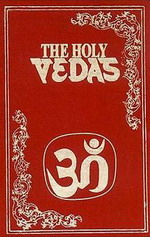The Aryans were a tribal and nomadic people whose origins may have been in the Indo-European homelands of southern Russia. Aryans were fierce warlike people who referred to themselves as noble.1 They used this term to distinguish themselves from those they conquered. Many viewed themselves as superior, and maintained this identity by being fierce. Their warlike nature allowed them to preserve their Vedic religion. Aryans believed in several gods, and they brought their religion to the regions in which they settled, namely to northern India starting around 2000 BCE. Scholars claim that the Vedic religion of the Aryans forms the basis of Hinduism.

The Aryan religion’s beliefs and practices are contained in the four Vedas: the Rig-Veda, the Sama-Veda, the Yajur-Veda, and the Atharva-Veda. The Rig-Veda, “Knowledge of the Hymns of Praise,” is the largest and oldest of the Vedas, and contains hymns to their gods. The Sama-Veda, “Knowledge of the Melodies,” contains hymns for religious rituals used as chants. The Yajur-Veda, “Knowledge of the Sacrificial formulas,” contains instructions for religious rituals and liturgy. Finally, the Artharva-Veda, “Knowledge of the Magic formulas,” was named after a kind of group of priests that cast spells against their enemies and diseases.2 Through the different Vedas, some of their gods were prayed to more than other gods, thus establishing the gods’ significance in the religion.
Although the Aryans worshiped several gods, they did not worship the same gods. Some of the gods that were worshiped in the Aryan religion were Prithivi, Indra, Surya, Vayu, and Agni. Prithivi was the goddess of the earth. Indra was the god of weather and of war. He was called the “breaker of forts” and was what the Aryan men believed a man should be like, namely, a warrior that has courage and energy. Surya was the sun god. Vayu was the god of the wind. Agni was the god of fire. He was the intermediary between the gods and humans. The Aryans believed that the god Agni ate the animals that were burned during their rituals. These sacrifices were carried out by their priests to acquire gifts from the gods, like having children, of obtaining wealth, living long, and being successful in war.3
One of the Aryan religion’s most meaningful rituals was the soma. Soma was a drink that was extracted from the celebrated soma plant described in the Rig- and Sama-Vedas. The ritual has been called the drink of the gods and the elixir of immortality. The drink was extracted from the plant by pressing or crushing the stalk of the plant using a mortar and pestle or pounding the stalks between two stones held in the hands. The extracted drink was then used as an offering to the gods or for drinking. When offered to the gods, they believed a person would gain a healthy long life, happiness, courage, strength, wisdom, and victory over enemies. When used as a drink it was believed to give the drinker understanding and creativity. The drink has also been called the procreator of thoughts as it prevents sleep and keeps the drinker awake and alert.4 The Aryan religion’s beliefs and practices have been the subject of considerable amount of research and debate. Perhaps the most debated aspect is how Hinduism developed from the Aryan religion. The Aryan Vedas are the oldest scriptures of the Hindu religion.
- Jerry Bentley, Herbert Ziegler, and Heather Streets Salter, Traditions & Encounters: A Brief Global History Volume 1, 3 edition (McGraw-Hill Education, 2013), 49. ↵
- Ancient History Encyclopedia, January 2013, s.v. “The Vedas,” by Cristian Violatti. ↵
- Ancient History Encyclopedia, January 2013, s.v. “Aryan,” by Cristian Violatti. ↵
- Encyclopedia Britannica, January 2015, s.v. “Soma.” ↵



29 comments
Aaiyanna Johnson
Although very intimidating, the Aryans heavily relied in their daily lives. It is very fascinating to me. It’s fascinating to me because even though they were a fierce group at the end of the day they were human. They too believed that by holding certain rituals one would have a long prosperous. It also interests me that they including nature into their religion.
Mario Sosa
The Aryan’s religion seems really fascinating. It amazes me that their polytheistic gods somewhat resemble the Greek gods that would form about a thousand years later. The one that got my attention was the god Indra who was the god of weather and war. It appears as if the Greeks took inspiration from Indra and split him up, becoming Zeus, god of thunder, and Ares, god of war. Overall great article, nice work!
Tyler Sleeter
Great article, very informative! I remember studying Hinduism and the four Vedas in high school, but I did not realize that they were taken from the Aryan Vedic religion. In fact, I did not know the Aryan’s were such an ancient group of people, having only heard of them as they relate to Nazism. I enjoy reading about old religions and learning how they came about and how they are often similar to other religions.
Steven Clinton
Interesting topic. The Hindu religion developed from the Aryan four Vedas. In the Four, Vedas set the principle beliefs in Hinduism and some of its core values. The Four Vedas polytheistic theme help influences the Hinduism into what it is today. This article was written beautifally; in that it was smooth, and the tone matched the topic. Great article I look forward to your next work.
Nahim Rancharan
The title the Four Vedas rang a bell when I first read the article and I knew that it had some relation to the Indian culture, as well as Hinduism, but I never knew that it had a connection to the Aryan warriors that existed in Asia. This article is organized in an excellent way so as to capture the important parts of this ancient religion. Additionally, it was fascinating to see how, although they did not see themselves as gods, the Aryan tried to emulate and embody the characteristics of the gods they worshipped, which meant behaving the way they expected their gods to behave, hold themselves to god-like standards and eating and drinking sacred foods. Overall a great article and an excellent read. Good Job!
Alexis Soto
This was one of the articles that drew me in for its interesting topic. I would never had thought about what the religion of the Aryans would have been like. That being said, I appreciate the fact that your article was well written. It was interesting to learn of the origins of the Aryan people and the relationship it has with the Hindu religion .
Priscilla Reyes
Hi!! I liked your article because it was easy to follow, yet you provided fresh information on the Aryan civilization and the Vedic religion. I also liked that you stated scholars claim that the Vedic religion is part of Hinduism. Reading your article reminded me of the article I published on a similar topic. I read one of the Vedas, but all of them seemed super interesting to me. Now even more after reading your description of them! The second thing I found interesting was that although they are polytheistic, they have many gods. Makes me wonder how they were chosen or how they came to be.
Johnanthony Hernandez
Well written article, I knew that the Vedas were from the Hindu religion and that the Aryans were from the Eastern Europe/ East Asia. But what I did not know what the Hindu Vedas and the Aryan Vedas are more or less the same thing, if I read that correctly. As well as that the Aryans came out of the Russian area, I did not really know much about the Aryans or their religious views until I read this article. Again, well done and a great amount of information.
Gabriela Serrato
Very well done article and very interesting as well. I find it interesting learning about past societies and their religions. I find it true that one of the few things that all past people have in common is that they all seemed to have a religion of some sorts. I found it fun by relating this to some of the Greeks many Gods. They too had many gods that would represent parts of the earth and I thought it was interesting that they related in this way. Very informative!
Cameron Mays
This article was interesting for me because I knew nothing of this topic beforehand. With that said, I wanted more out of it, or at least for you to touch on what these people were like and what they did. In other words, did they conquer a lot, how did their hierarchy of power within the community work, and other things like that, while still keeping the focus primarily on their religion.